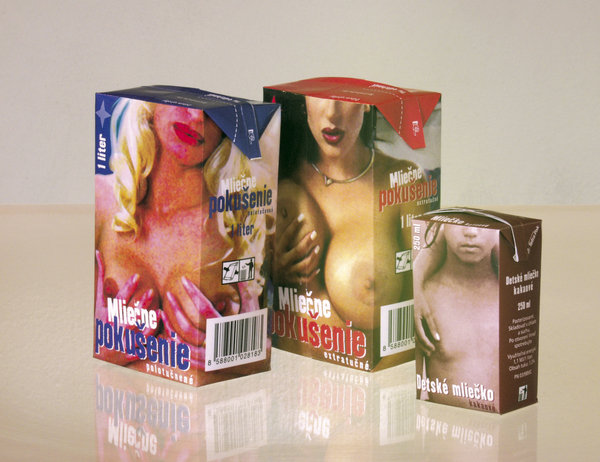Gender Check
dal 11/11/2009 al 13/2/2010
Segnalato da
Anri Sala
Anita Arakelyan
Anna Koushar
Ismet Mujezinovic
Sejla Kameric
Alla Georgieva
Sanja Ivekovic
Tomislav Gotovac
Bela Kolarova
Veronika Bromova
Mare Tralla
Cornelia Schleime
Fritz Skade
Emese Benczur
Orshi Drozdik
Tibor Hajas
Erzen Shkololli
Aija Zari
Zenta Dzividzinska
Egle Rakauskaite
Sofija Veiveryte'
Zaneta Vangeli
Valentina Rusu-Ciobanu
Jelena Tomasevic
Wojciech Fangor
Katarzyna Kobro
Katarzyna Kozyra
Alexandra Croitoru
Ion Grigorescu
Lia Perjovschi
Anna Alchuck
Oleg Kulik
Vladislav Mamyshev-Monroe
Marina Abramovic
Tanja Ostojic
Anetta Mona Chisa
Lucia Tkacova
Jana Zelibska
Tadej Pogacar
Duba Sambolec
Arsen Savadov
Oleksandr Kharchenko
Boris Mikhailov
Bojana Pejic
11/11/2009
Gender Check
Museum Moderner Kunst MUMOK, Wien
The first comprehensive exhibition featuring art from Eastern Europe since the 1960s based on the theme of gender roles. 20 years after the fall of the Berlin Wall, the curator Bojana Pejic, along with a team of experts from 24 different countries, has put together a selection of over 400 works including paintings, sculpture, installations, photography, posters, films and videos. With over 200 artists, the exhibition paints an exceptionally diverse picture of a chapter in art history that until recently had been largely unknown and that could also act as an important addition to contemporary gender discourse.

Femininity and Masculinity in the Art of Eastern Europe
Curated by Bojana Pejić
“Gender Check” is the first comprehensive exhibition featuring art
from Eastern Europe since the 1960s based on the theme of gender
roles. 20 years after the fall of the Berlin Wall, the curator Bojana
Pejić, along with a team of experts from 24 different countries, has
put together a selection of over 400 works including paintings,
sculpture, installations, photography, posters, films and videos. With
over 200 artists, the exhibition paints an exceptionally diverse picture
of a chapter in art history that until recently had been largely
unknown and that could also act as an important addition to
contemporary gender discourse.
“Gender Check” follows the changes in the representation of male and
female role models in art — especially as they develop under different
socio-political conditions. The exhibition, initiated and supported by the
ERSTE Foundation, shows the interrelationship between art and history
following both a chronological and thematic approach:
Up into the 1960s, heroic male and female workers were the dominant
figures in the socialist realist tradition of art.
The intended reality-
transforming program of a “sexless society” propagated by the state was
met with irony and unmasked by unofficial art at the time. Following the
period of collective state utopian aesthetics, different individual and
more open tendencies could be found on a local level — periodically
provoking a hostile response — that created independent spaces for
nonconformist art. Beginning in the 1970s, ideals of femininity and
masculinity were reexamined beyond the propagandist clichés of the
past: Self-portraits and representations of the body and subjectivity
began to hint at a newfound self-confidence also reflected in openly
displayed sexuality that called heterosexual standards and heroic ideals
of masculinity into question. Even many of the abstract pieces worked
with anthropomorphic forms and the relationship between the sexes
within society.
The emancipation from role models went along with an emancipation
from traditional means of expression, as new media and art forms like
photography, film, video and performance became increasingly
important. At the same time, more and more female artists began to gain
in prominence.
With the fall of the wall in 1989 and the end of socialist regimes, new
challenges became evident in the face of rising nationalism and
neoliberal influences from the west. The newly won freedoms came
hand in hand with neoconservative role constraints that soon also
became the topic of artworks. A critique of chauvinist, militaristic,
misogynist and xenophobic ideologies were expressed in the context of
feminist theory. Homosexuality began to be brought up. Clichés about
motherhood and traditional religious-inspired ideals of femininity and
patriarchal power structures came under critique. To underline the
political and public significance of female identity, allusions came to be
made to historical allegories of femininity.
A Short List of the Artists:
Anri Sala, Anita Arakelyan, Anna Koushar, Ismet Mujezinović, Šejla Kamerić, Alla
Georgieva, Sanja Iveković, Tomislav Gotovac, Běla Kolářová, Veronika Bromová, Mare
Tralla, Cornelia Schleime, Fritz Skade, Emese Benczúr, Orshi Drozdik, Tibor Hajas,
Erzen Shkololli, Aija Zari a, Zenta Dzividzinska, Egle Rakauskaite, Sofija Veiveryté,
Zaneta Vangeli, Valentina Rusu-Ciobanu, Jelena Tomašević, Wojciech Fangor,
Katarzyna Kobro, Katarzyna Kozyra, Alexandra Croitoru, Ion Grigorescu, Lia Perjovschi,
Anna Alchuck, Oleg Kulik, Vladislav Mamyshev-Monroe, Marina Abramović , Tanja
Ostojić, Anetta Mona Chisa/Lucia Tkacova, Jana Želibská, Tadej Pogačar, Duba
Sambolec, Arsen Savadov & Oleksandr Kharchenko, Boris Mikhailov and many more.
List of Countries and Researchers:
Albania (Edi Muka), Armenia (Eva Khachatryan), Bosnia und Herzegovina (Dunja
Blažević), Bulgaria (Maria Vassileva), Estonia (Katrin Kivimaa), Germany (Angelika
Richter), Georgia (Lali Pertenava / Nino Tchogoshvili), Kosovo (Erzen Shkololli), Croatia
(Ivana Bago), Latvia (Mara Traumane), Lithuania (Laima Kreivyte), Macedonia (Suzana
Milevska), Moldova (Lilia Dragneva), Montenegro (Bojana Pejić), Poland (Izabela
Kowalczyk), Rumania (Alina Serban), Russia (Keti Chukrov), Serbia (Branislav
Dimitrijević), Slovakia (Zora Rusinova), Slovenia (Urška Jurman), Czech Republic
(Martina Pachmanová), Ukraine (Hedwig Saxenhuber), Hungary (Edit András), Belarus
(Almira Ousmanova).
Symposium
The symposium “Reading Gender. Art, Power and Politics of
Representation in Eastern Europe” will take place November 13 and 14 in
the auditorium of the MUMOK. International experts have been invited to
speak about the role of feminist theories in Eastern Europe with respect
to a western context, about the significance of transgender positions as
well as the new definition and revision of canonic ideals of gender.
Further Information: http://www.gender-check.at
Gender Check was initiated and supported by the ERSTE Foundation
http://www.erstestiftung.org
MUMOK partners: Air France, Dorotheum, Uniqa, Wirtschaftskammer Wien, Wittmann
Media partners: Der Standard, Ö1, Compliment and Wienerin.
Press Contact: Eva Engelberger
Barbara Hammerschmied
T +43 1 52500-1400,14500 F+43 1 52500-1300
press@mumok.at
Opening November 12, 2009, h19
MUMOK
Museumsplatz 1, A 1070 Vienna
Levels 4, 5, 6, 8
Opening HoursThurs. 10-21
Entrance Fee Standard € 9, Reduced € 7.20 or € 6.50



